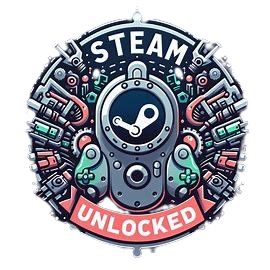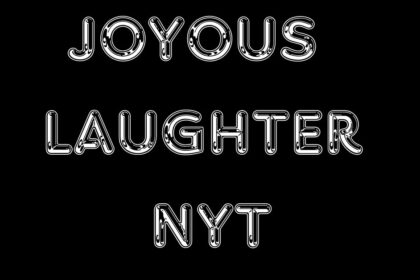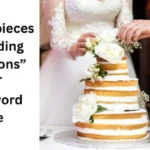Crossword puzzles have been a popular pastime for decades, and the New York Times (NYT) crossword is one of the most prestigious and widely recognized. Among the myriad of clues presented in these puzzles, some are straightforward, while others are more challenging, requiring lateral thinking or an understanding of wordplay. One such clue that often puzzles solvers is “joyous laughter.” Let’s dive into the intricacies of this clue, explore its possible answers, and understand why it appears frequently in crossword puzzles.
Introduction to NYT Crossword Puzzles
The New York Times crossword puzzle has been a beloved feature since its inception in 1942. Known for its challenging clues and diverse themes, it attracts solvers from all walks of life. While some clues are direct and straightforward, others, like “joyous laughter,” require a deeper understanding of language, wordplay, and sometimes even cultural references. The thrill of solving such puzzles lies in the balance between challenge and satisfaction.
The Nature of Crossword Clues
Crossword clues come in many forms, from the straightforward to the cryptic. Understanding these clues requires not just a grasp of language but also an appreciation for nuance and wordplay. Some clues are designed to be misleading, requiring solvers to think outside the box. The key to success is recognizing these patterns and knowing when a clue is playing with synonyms, homophones, or even cultural idioms.
Different Types of Crossword Clues
In crossword puzzles, clues can be categorized into several types:
- Direct clues: These provide a straightforward description of the answer.
- Cryptic clues: These involve wordplay, anagrams, or hidden meanings.
- Synonym clues: These rely on finding a word with the same meaning as the clue.
- Homophones: Clues that sound like the answer but are spelled differently.
Understanding the type of clue you’re dealing with is the first step in solving it.
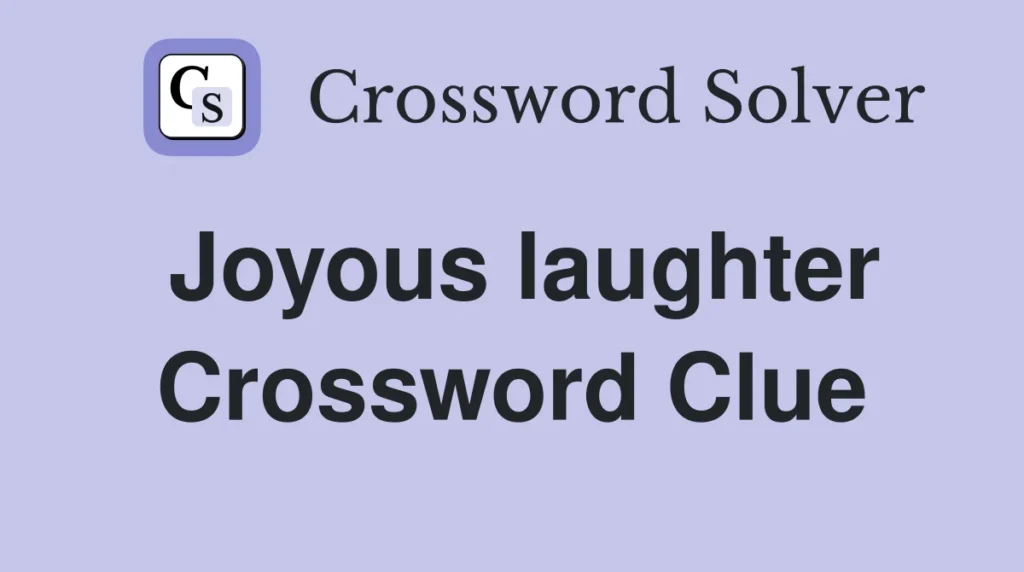
The Importance of Wordplay and Synonyms
Wordplay is a fundamental aspect of crossword puzzles, particularly in more advanced puzzles like those found in the NYT. Solvers must often think of words not in their literal sense but in how they might be manipulated or reinterpreted. Synonyms are frequently used in crosswords, and recognizing them can be crucial to finding the right answer.
Dissecting the “Joyous Laughter” Clue
The phrase “joyous laughter” might seem simple at first glance, but in the world of crosswords, it’s ripe for misinterpretation. The clue often prompts solvers to think of synonyms or related expressions that fit the number of squares available in the grid. It’s also important to consider the tone of the puzzle; is it leaning towards a more playful answer, or something more straightforward?
Understanding the Clue’s Wording
The clue “joyous laughter” is typically used to evoke an emotional response. However, in a crossword context, it’s essential to think of all possible synonyms or related words. For instance, words like “glee,” “mirth,” or “elation” might come to mind. The challenge is to match the length of the answer to the spaces available in the puzzle.
Common Interpretations and Misdirections
Solvers might initially think of obvious answers like “giggle” or “chuckle,” but these may not always fit the puzzle. Crossword creators often use misdirection, leading solvers down a path that seems correct but isn’t quite right. Recognizing when you’re being misled is key to solving these clues.
Common Answers for “Joyous Laughter”
Given that crossword puzzles vary in difficulty, the answer to “joyous laughter” can change depending on the puzzle’s context and the length of the answer needed.

Typical Answers Based on Clue Length
- Short answers (3-4 letters): “Ha!” or “Ho!”
- Medium answers (5-6 letters): “Mirth,” “Gleeful”
- Long answers (7+ letters): “Elation,” “Jubilation”
How Context Changes the Possible Answers
The surrounding clues and the overall theme of the puzzle can significantly influence the correct answer. For instance, in a puzzle with a festive theme, “jubilation” might be the right fit. In contrast, a simpler, everyday puzzle might opt for something more straightforward like “glee.”
Synonyms of Laughter in Crossword Puzzles
Laughter is a common theme in crosswords, and solvers should be familiar with various synonyms that might appear.
Exploring Different Synonyms Used in Crosswords
Some common synonyms for laughter include:
- Glee
- Mirth
- Hilarity
- Amusement
- Chortle
When to Use Each Synonym Based on Clues
The choice of synonym often depends on the puzzle’s difficulty and the length of the answer. For instance, “glee” is a simple, three-letter word, often used in easier puzzles. In contrast, “hilarity” is more complex and might appear in more challenging crosswords.
Wordplay in Crossword Puzzles
Wordplay is a staple of the NYT crossword, and understanding it is crucial for solving clues like “joyous laughter.”
How Wordplay Influences Clue Interpretation
Wordplay can take many forms, from anagrams to puns to homophones. In the case of “joyous laughter,” the wordplay might involve using a less common synonym or a phrase that sounds like laughter but has a different meaning.

Examples of Wordplay Related to “Laughter”
For example, a clue might use “ha-ha” as a homophone for “haha,” playing on the sound of laughter. Or, it might use “tickled” as a reference to something that causes laughter, rather than the physical action of tickling.
Examples from NYT Puzzles
The “joyous laughter” clue has appeared in various forms in past NYT puzzles. Each time, the answer has varied depending on the puzzle’s theme and difficulty.
Past Occurrences of “Joyous Laughter” in NYT Crosswords
- April 2021: “Glee” was used in a spring-themed puzzle.
- December 2019: “Mirth” was the answer in a holiday puzzle.
- July 2018: “Hoho” was the correct answer in a lighthearted, summer-themed crossword.
Analysis of Those Specific Puzzles
In each of these examples, the answer fit not only the clue but also the overall theme of the puzzle. This demonstrates how important it is to consider the broader context when solving crossword clues.
Why “Joyous Laughter” is a Popular Clue
Emotions, particularly positive ones like laughter, are commonly used in crossword puzzles. They resonate with solvers and can be interpreted in various ways.
The Appeal of Emotions in Crossword Clues
Emotional clues like “joyous laughter” tap into universal experiences, making them relatable and engaging. This relatability is one reason why such clues are popular among crossword creators.
How This Clue Taps Into Universal Experiences
Everyone has experienced joyous laughter at some point, making the clue familiar yet open to interpretation. This duality is what makes it both challenging and satisfying to solve.
Techniques for Solving Difficult Clues
Solving challenging crossword clues requires a mix of skill, patience, and strategy. Here are some techniques to help.
Tips and Tricks for Solving Tough Crossword Clues
- Consider all synonyms: Don’t settle for the first word that comes to mind.
- Think about the puzzle’s theme: The answer may relate to the broader theme.
- Look at the surrounding clues: They can provide hints or confirm your suspicions.
How to Approach Clues Like “Joyous Laughter”
Start by listing possible synonyms and then narrow them down based on the length of the answer and the theme of the puzzle. If you’re stuck, move on to other clues and come back with fresh eyes.
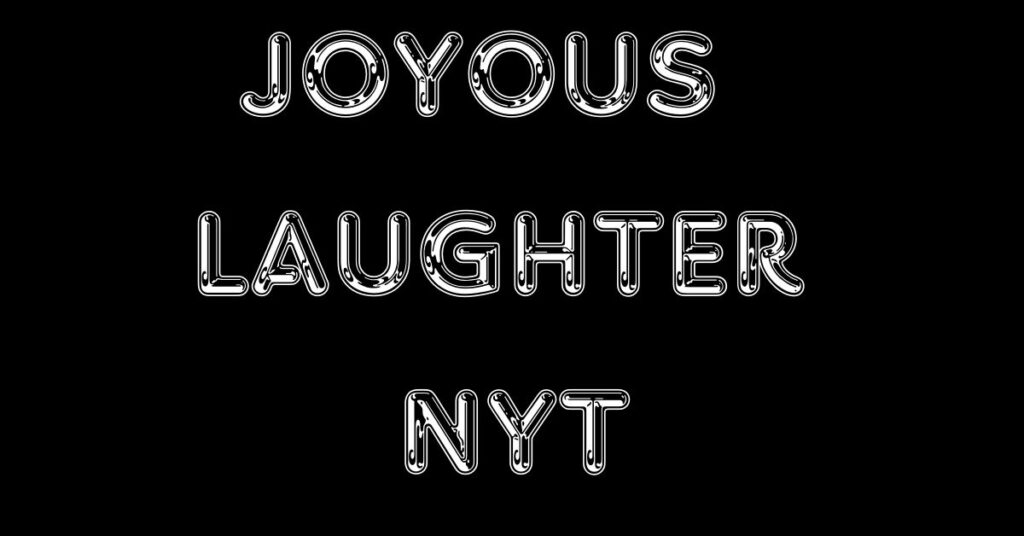
The Role of Emotions in Crossword Puzzles
Emotions are a rich source of inspiration for crossword creators, offering a wide range of possible answers.
How Emotions Are Commonly Used in Crossword Clues
Emotions are often used to evoke a response from the solver, making the puzzle more engaging. Clues like “joyous laughter” are effective because they connect with the solver on a personal level.
The Psychology Behind Emotional Clues
Emotional clues play on our natural human instincts, making them more memorable and satisfying to solve. They often require solvers to think beyond the literal, tapping into their own experiences.
Crossword Puzzles and Cultural References
Crossword puzzles often incorporate cultural references, and this can influence how clues like “joyous laughter” are interpreted.
How Culture Influences Crossword Clue Answers
The cultural context can change the meaning of a clue. For example, a clue related to laughter might reference a popular comedian or a famous comedy movie, altering the expected answer.
The Cultural Significance of Laughter in Puzzles
Laughter is a universal human experience, making it a powerful tool for crossword creators. It can be referenced in various ways, from simple synonyms to complex cultural allusions.
The Evolution of Crossword Clues
Crossword clues have evolved over the years, becoming more complex and varied.
How Crossword Clues Have Changed Over the Years
In the early days of crosswords, clues were often straightforward. However, as puzzles became more popular, creators began to experiment with wordplay, cultural references, and emotional clues.
The Future of Clues Like “Joyous Laughter”
As crossword puzzles continue to evolve, we can expect to see more creative and challenging clues related to emotions like laughter. The growing sophistication of solvers means that puzzle creators will continue to push the boundaries of what is possible.
Comparing NYT Crosswords with Other Publications
Different crossword publications have different styles, and this can affect how clues like “joyous laughter” are presented.

Differences in Crossword Clue Styles Across Publications
The NYT crossword is known for its clever wordplay and cultural references, while other publications might focus more on straightforward clues. This means that the same clue could have different answers depending on where it appears.
How “Joyous Laughter” Might Appear in Other Crosswords
In a simpler puzzle, the answer might be something like “giggle,” while in a more complex puzzle, it could be “mirth” or “hilarity.” Understanding the publication’s style is key to solving the clue.
The Satisfaction of Solving Cryptic Clues
There’s a unique satisfaction in solving a tough crossword clue, especially one that involves wordplay or emotional resonance.
The Joy of Cracking a Tough Clue
When you finally figure out a challenging clue like “joyous laughter,” it’s a moment of triumph. That sense of accomplishment is one of the reasons crossword puzzles are so addictive.
Why Solving Challenging Clues Is Rewarding
The reward of solving a tough clue lies in the mental effort required. It’s not just about finding the right answer, but about the journey to get there. The more challenging the clue, the greater the satisfaction when you solve it.
Conclusion
The joyous laughter crossword clue nyt is a perfect example of how emotions, wordplay, and cultural references come together to create a challenging yet rewarding puzzle experience. By understanding the different types of crossword clues, recognizing common synonyms, and considering the puzzle’s broader context, solvers can crack even the most cryptic clues. So, the next time you encounter “joyous laughter” in a crossword, you’ll be well-equipped to find the answer with a smile.
FAQs
1. What are the most common answers for “joyous laughter” in crosswords?
Common answers include “glee,” “mirth,” and “hoho,” depending on the puzzle’s length and theme.
2. How does context influence crossword clue answers?
The surrounding clues and overall theme of the puzzle can significantly impact the correct answer for a clue like “joyous laughter.”
3. What is the significance of wordplay in crossword puzzles?
Wordplay adds an extra layer of challenge and enjoyment to crosswords, requiring solvers to think creatively about the clues.
4. Why do emotions like laughter appear frequently in crosswords?
Emotions resonate with solvers, making them a popular choice for crossword creators who want to engage their audience on a personal level.
5. How can beginners improve their crossword-solving skills?
Practice regularly, familiarize yourself with common crossword terms and synonyms, and don’t be afraid to think outside the box.
